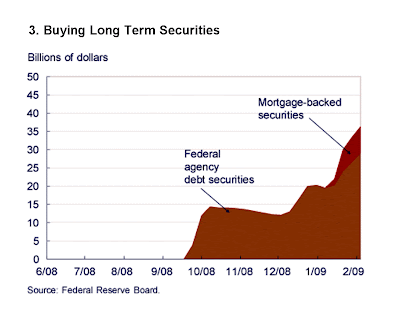“They [the Fed's financial crisis programs] all make use of the asset side of
the Federal Reserve’s balance sheet. That is, each involves the Fed’s
authorities to extend credit or purchase securities.”
Ben Bernanke, London School of Economics, January 13, 2009
The Fed's strategy is to expand Balance Sheet and to change the mix of the financial assets it holds to stimulate specific troubled markets.
As you will recall, the Fed's Balance Sheet provides the backing for the US Dollar currency among other things, and traditionally has consisted of gold, US Treasury Debt, and the explicitly guaranteed debt of agencies like Ginnie Mae.
What the Fed is doing is expanding the assets on its Balance Sheet, which is quantitative easing, but is doing it by adding specifically targeted non-traditional assets.
The Bernake Fed distinguishes its own approach from the "quantitative easing" of the Bank of Japan. It is an expansion of the central bank's balance sheet, but in the case of the Fed, with a bias. Bernanke calls it 'credit easing' while we prefer to call it 'qualitative easing.'
The Fed is deciding specifically where and to whom to apply its qualitative easing.
This is the controversial part of the program, because the Fed no longer manages the money supply and interest rates, and the general health of the banking system, but targets specific markets and companies for its monetization efforts.
In effect, one might say that the Fed has begun to assume a central planning role for the economy that decides, with specifics, who fails and who survives to succeed. What is troubling in particular is that so far the Fed has retained the perogative to do this without disclosure of the specifics even to Congress.

Bernanke divides the use of balance sheet assets into three groups:
1. lending to financial institutions,
2. providing liquidity to key credit markets, and
3. purchasing longer-term securities.



What does "Buying Longer Term Securities" mean? In November 2008, the Federal Reserve announced plans to purchase the direct
obligations of the housing-related government-sponsored enterprises (GSEs),
specifically Fannie Mae, Freddie Mac, and the Federal Home Loan Banks. In
principle, the extra demand for these obligations is designed to increase the
price of the securities and thereby lower rates paid for mortgages.
Additionally, the Fed outlined plans to purchase mortgage-backed securities
backed by Fannie Mae, Freddie Mac, and Ginnie Mae. These actions were designed
to improve the availability of credit for the purchase of houses, therefore
supporting the housing markets and financial markets in general.Source: The Federal Reserve

































